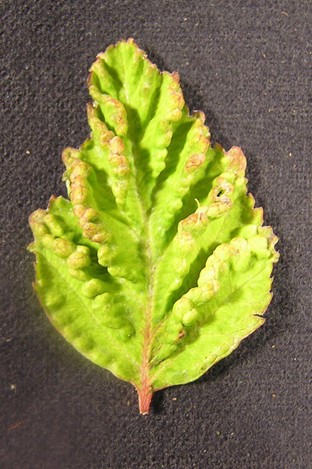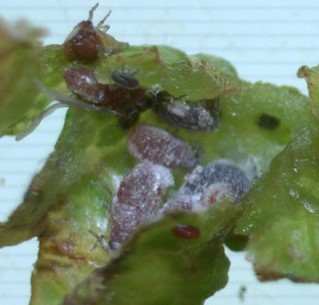Arkansas Plant Health Clinic Disease Notes
Contact
Plant Diagnostician
Phone: (479) 575-2727
Email: ssmith@uada.edu
Jason Pavel
Diagnostician
Phone: (479) 575-7257
Email: jpavel@uada.edu
University of Arkansas System Division of Agriculture
Cralley Warren Building
Room 16
2601 N. Young Ave.
Fayetteville, AR 72704
Birch Gall Aphids
Sherrie Smith and Jason Pavel
Plant Health Clinic Disease Note Issue 13
The clinic received our first sample this season of birch leaves with galls. Although alarming to homeowners, Spiny witch-hazel gall aphids Hamamelistes spinosus, do no serious harm to healthy trees.

(Photo by Sherrie Smith, University of Arkansas System Division of Agriculture Cooperative Extension Service)
What are the symptoms of birch aphids?
The first symptoms are birch leaves with distorted corrugations or bumpy ridges. Infested leaves turn brown and fall from the tree. However, control is not usually warranted because healthy trees produce a new crop of leaves to replace those destroyed by the aphids.
Aphid Life Cycle
The life cycle of this interesting aphid takes two full years to complete. Eggs are laid on witch-hazel in June and July. The eggs hatch in the spring and the nymphs feed on the flower buds. The feeding activity causes a spiny gall to form on the affected witch-hazel. Winged aphids develop inside the spiny galls, then leave and fly to birch. This generation gives birth to a scale-like generation, which hibernates on birch until the following spring. At bud-break the scale-like aphids feed on the new leaves, causing them to form corrugated galls. When the aphids mature into winged adults, they migrate back to witch-hazel.
How do I control birch aphids?
For homeowners wanting control imidacloprid may be used at bud-break in the spring.
Take Aways:
- Promote good tree health with adequate water and fertilize per soil test.
- Apply insecticides at new growth in the spring (usually not necessary).

Birch Spiny Witch-hazel Gall Aphids- Hamamelistes spinosus
(Photo by Sherrie Smith, University of Arkansas System Division of Agriculture Cooperative Extension Service)
This work is supported by the Crop Protection and Pest Management Program [grant no. 2017-70006- 27279/project accession no. 1013890] from the USDA National Institute of Food and Agriculture.
Follow us on Facebook!
UAEX Plant Health Clinic